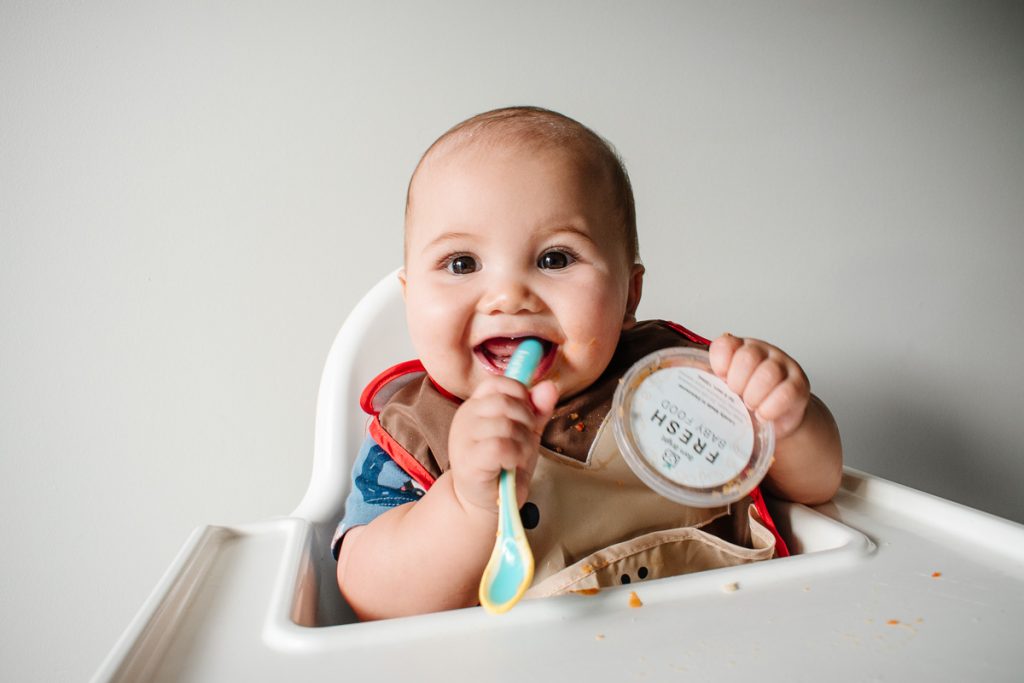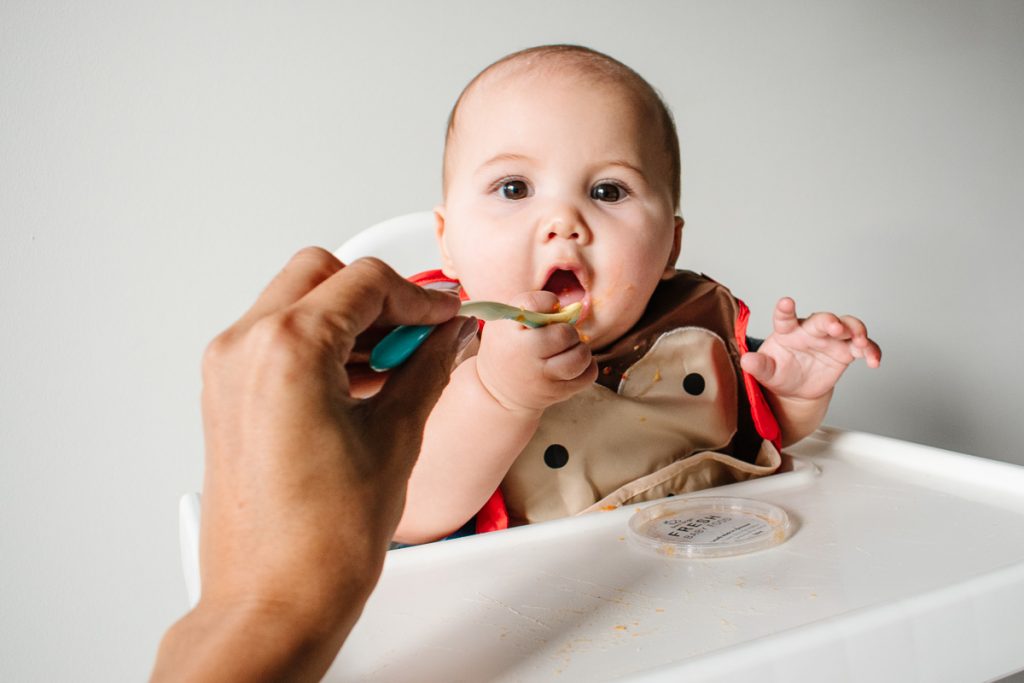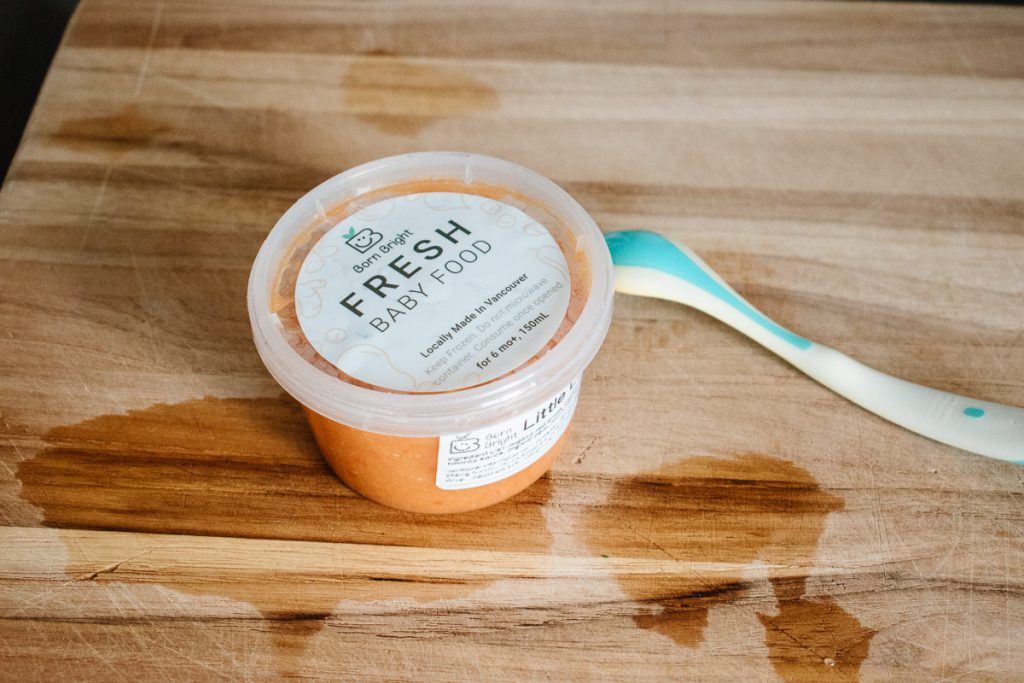
With a growing 8 month old baby and a 3 year old who USED to eat everything (and now has her select favourites), I think about their nutrition everyday. I think about sugar, incorporating veggies into every meal and I wonder if eating an enormous amount of baby mum-mums is okay…
Introducing Vancouver Dietician Carla Obando from Born Bright Baby Foods to help me understand my kids’ nutrition a bit better!
1) Working at the hospital, how have you seen the right nutrition make kids feel better?
I’m glad you asked this question. Nutrition can sometimes be overlooked and is a very important and key component of overall health and development for a child. As a dietitian at BC Children’s Hospital, I work closely with many parents and kids to help them get the best nutrition they can to support their health needs. Good nutrition in a hospital setting help kids heal faster from surgeries, help fight infection, and most importantly, grow and develop. I work particularly closely with babies that are premature in the Neonatal Intensive Care Unit or NICU. My role as a dietitian in that setting is to create specialized nutrition for premature or sick babies that would help them grow healthy, strong and independent from medical support. It amazed me how premature babies (they can be the size of a large avocado!) can thrive and grow, with help from a medical team and a large emphasis on nutrition. It inspired me to start Born Bright Foods because there should be an emphasis on fresh ingredients and nutrition in the baby food industry. Nutrients are the building blocks for babies to grow and stay healthy.
There should be an emphasis on fresh ingredients and nutrition in the baby food industry

2) When I’m grocery shopping for the kids, what is the biggest thing I should pay attention to on a food label for infants & toddlers’ food?
My general advice is fresh ingredients are best and convenient packaged foods are good too — but as parents, we have to do a bit of label reading at the grocery store. Three things to pay attention to: the amount of salt, the amount of sugar per serving on food labels, and what is on the ingredient list. Processed or packaged foods often contain greater amounts of salt and sugar — and the tricky part is that sometimes packaged or convenient foods can be marketed as “healthy” to parents and kids.
Sodium & Sugar
Sodium (found in salt), and sugar are naturally found in all foods and are part of a healthy nutrition. However, too much salt and sugar from packaged foods can contribute to poor health and eating habits at a young age. A high salt in packaged foods is generally more than 15% DV (daily value) sodium in a serving size. Babies less than a year old should not have table salt added to their food or family foods with added salt as they cannot process it well like adults do. As they become toddlers, they can start trying some of the family foods with minimal salt added. Sugar on the other hand is listed in grams only. A high sugar is more than 13g or more of sugar per serving. What is most important with sugar is the type of food you are offering. Offering healthy natural sugars from fruits and vegetables are important because they contain fiber, vitamins and minerals. On the other hand, sugars found in processed foods like pop, candy and sweet snacks are often empty calories and offer little beneficial nutrients, and should be limited.
Ingredient List
Not all processed or packaged foods are bad. By looking at the ingredient list, this will help you recognize if a food product is wholesome and healthy. Select products with ingredients that are natural, familiar, simple ingredients that are easy to recognize, understand, and pronounce. These are generally simple and wholesome choices as snack or convenient foods.

Read: 10 Things You Need For Meal Time with Baby
3) I noticed that the combos you create for Born Bright Foods includes some spices. How is that beneficial for babies?
Spices and Herbs are healthy and a great way to create tasty meals that help babies develop an adventurous palate. They are also healthy and packed with nutrients as well. Vegetables are naturally bitter and newborns are naturally not drawn to bitter and unfamiliar foods. However, by creating tasty flavors and food combinations using herbs and spices at Born Bright Foods, babies love them and associate positive experiences with vegetables. This then creates adventurous eaters and healthy eating habits right at the start. When I develop recipes, I ensure that they are not just fresh, nutritious and balanced, but each recipe is tasty and baby-approved!
4) My toddler is picky. Should I be concerned if she doesn’t like to eat meat? What about if she doesn’t like veggies? But LOVES pizza and anything with cheese on it.
If your child refuses to eat meat or vegetables, it is normal as they are developing preferences and personalities. Simply remove the uneaten food without commenting, and try not to force them to finish the food. You can continue to offer meat and veggies during family meal times, but do not pressure your child. Research shows that children need at least 10 exposures to a food for them to even consider it. It also helps if a child observes their parents eating and enjoying the food as part of their family meal, as kids tend to look at their parents as role models. My tip is the more you pay attention to picky eating, it is more likely to continue.
Kids would sometimes only eat one food. This is called a ‘food jag’. Let your child have it if the food is healthy. If the food is unhealthy, limit how often you offer it or have it in the household. Food jags tend to resolve soon and rarely last for a long time, just continue to offer other foods to enjoy.
Research shows that children need at least 10 exposures to a food for them to even consider it.
Should you be concerned when they avoid foods or meals? Occasionally, it is okay for a child not to eat a meal or certain foods. Saying no to food is actually a way of having food choices and independence. It will not harm a healthy child as they learn to be independent and learn their cues for hunger and fullness. Sometimes they may not want to eat because they are tired, upset or excited. If they are avoiding a specific food and you are concerned they are missing out on nutrients, simply offer an alternative food that has similar nutrition.
When should you be concerned? When a child is missing out on a specific food group for a long period of time or is starting to experience significant weight loss or poor growth. Seek advice from a healthcare professional such as a registered dietitian or pediatrician.
5) How can I make sure she’s getting enough nutrients? Should kids take vitamins? Is it recommended?
A child is getting enough nutrients when their diet is made up of balanced meals and snacks with a variety of food from each of the four food groups: Grains, Fruits & Vegetables, Dairy and Milk alternatives, Meat and alternatives. Multivitamins are usually not required if a child is eating a healthy balanced diet. Vitamin D can be supplemented if your child is not getting enough from food sources. We can only get vitamin D from sunshine (and we don’t get a whole lot in BC), and from select food sources like fatty fish such as salmon, tuna, sardines, and some fortified foods such as milk, yogurt, orange juice, and cereals. A kid’s multivitamin can be taken if you think your child may not be getting enough vitamins and minerals. For specific nutrients, growth or diet concerns, consult a pediatrician or a registered dietitian.


Carla Obando is your friendly pediatric dietitian from Vancouver, BC. She works closely with babies and parents at BC Children’s Hospital. She is also the founder of Born Bright Foods, a food delivery service that provides fresh baby food and toddler meals for busy parents and hungry tummies in British Columbia, Canada. She’s on a mission to refresh the baby food industry. Follow their journey at www.bornbrightfoods.com


